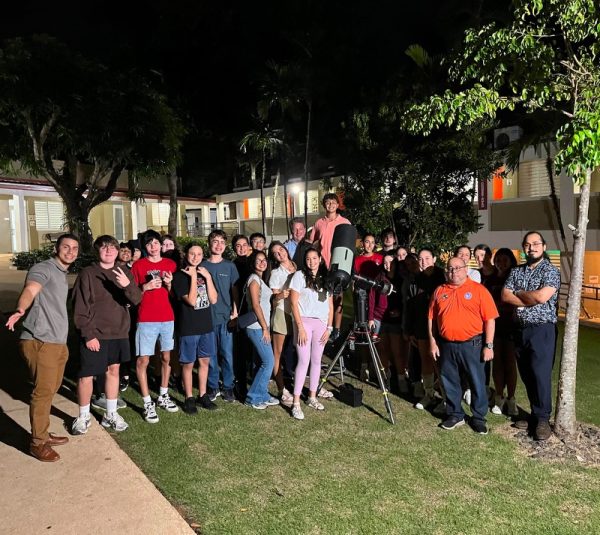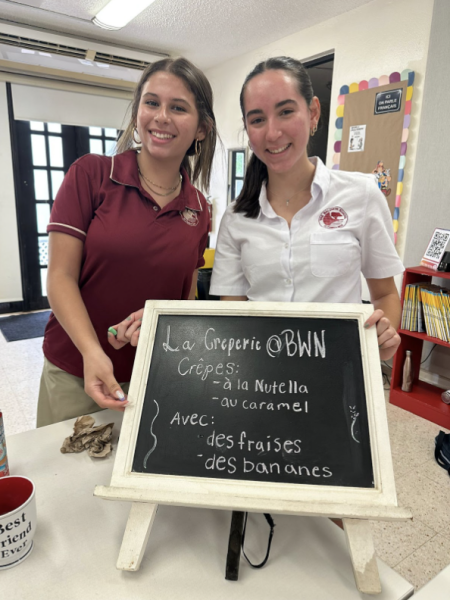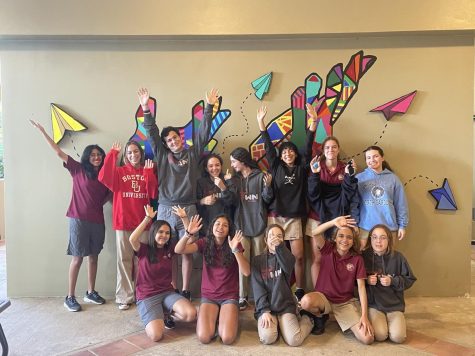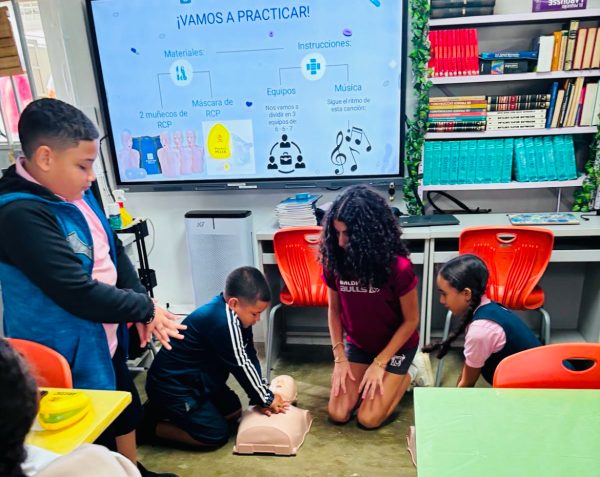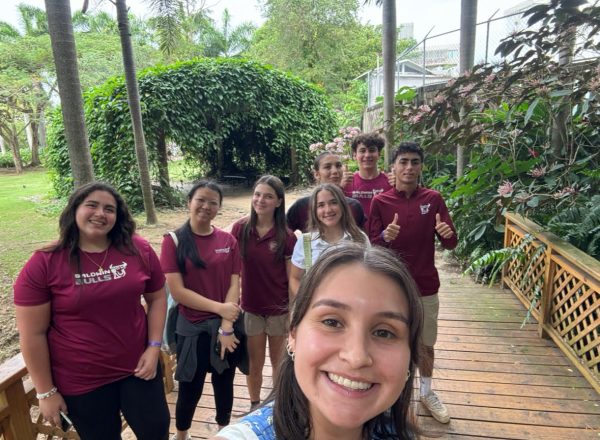Model United Nations: The Perspective of A Moderator
If you are a student in Baldwin, it is almost certain that you have heard of the club Model United Nations and how frustrating or rewarding it can be from the perspective of different students. But what truly is MUN and why do so many students say such different things about it? Model United Nations is a club that simulates the real United Nations, where most decisions are made by countries, organizations, and important people regarding global issues like climate change, poverty, or warfare, among other problems. Students compete in this club by going to conferences held in other high schools and participating in a committee about a specific topic. In those committees, students will represent a delegation and that delegation’s ideas regarding the topic and they will debate to come up with a viable solution, in which the best delegates according to the chair or president of that committee will receive awards. While this definition shows the competition from a student’s point of view, the moderator or the teacher that supervises the club and assigns delegations does not show their view on managing the club and preparing students. That is why I interviewed Mrs. Moran, the MUN moderator for Baldwin, to get her perspective on what is MUN in Baldwin and its aspects and whether more students should join.
INTERVIEWER: How did your interest in Model United Nations start? Was it when you were into your teaching career or did you participate as a delegate in high school?
MRS. MORAN: I participated in my senior year in high school. Then, when I started teaching, they needed a moderator for the new club and I was the only one who was up to the challenge.
INTERVIEWER: Can you briefly describe your years as a delegate if you had any?
MRS. MORAN: I did not take it seriously. I did not understand the process nor was it explained to me, so I did not do as well as I could have done if I knew what I was doing. I had to figure a lot out by myself.
INTERVIEWER: When did you first become a moderator for the club in Baldwin?
MRS. MORAN: I became a moderator in the school year 2008-2009.
INTERVIEWER: Can you describe your first year as a MUN moderator?
MRS. MORAN: It was a fun year, but the club was really unorganized. It did not belong to Federación or Congreso, there were maybe three kids in the club, and I had to do a lot of begging for other kids to join. By the next year though, we went from having three kids to having about twenty.
INTERVIEWER: When did you start traveling outside the island for MUN with the Baldwin team?
MRS. MORAN: February 2009 was our first trip. We went to NAIMUN in Georgetown, Washington D.C.
INTERVIEWER: Can you describe your first experience traveling as a moderator? Where did you go and how did the delegates do?
MRS. MORAN: All the students that went participated in committee but only three or four delegates took it seriously, and they were the foundation of the club for its upcoming years. They truly helped turn the club into what it is today from its early stages.
INTERVIEWER: How has your traveling experience with students changed when comparing before and now?
MRS. MORAN: Kids are kids, and some years have been easier than others. The hardest part is trying to get all of my students to be together and all of them to be one Baldwin when we are abroad, but all experiences have been fun and unique.
INTERVIEWER: Do you feel MUN has changed when comparing its procedures before and now? How come?
MRS. MORAN: Way back in the ’80s and ’90s, NAIMUN was only traditional committees like GA, ECOSOC, and others like that. Little by little though, as MUN became a more popular club across the United States and Puerto Rico, there were changes so committees could become more specified, like making crises, cabinets, adhocs, historic committees, and futuristic committees. That then started to develop and in my opinion become even more popular than your traditional GA and ECOSOC. As a result of that happening, Puerto Rico also adopted those changes.
INTERVIEWER: What are some hardships you have encountered throughout your years as a moderator?
MRS. MORAN: Being able to give an equal amount of time to each student has been hard as well as being able to have the time to balance MUN with school. The consistency of kids in the club and finding the right meeting day for them varies a lot because there are so many other things going on at Baldwin.
INTERVIEWER: How have you changed as a moderator and person when comparing your first year moderating MUN to now?
MRS. MORAN: Definitely being a mom has complicated things because MUN used to be everything, I did not have to prioritize. Now, I do and it’s harder because some years ago we had a very special teacher at Baldwin called Mr. Davidson and he understood MUN and how it helps students and he enjoyed researching and debating with the kids, so having two dedicated teachers really made a difference. I would love to get back to when the club had that other teacher that helped out and we complimented each other on the research and day to day tasks, it would be greatly beneficial if Baldwin had one more full-time staff MUN advisor.
INTERVIEWER: How would you compare the people that leave high school participating in MUN to those who do not participate?
MRS. MORAN: Well, I cannot make generalizations like that. However, I can tell you that many of the students that graduate from MUN have confidence in them and are willing to try new things, they are big risk-takers and are committed citizens. Even as they come from all walks of life, they are able to defend a wide range of arguments and help other people complete and achieve their goals.
INTERVIEWER: How would you describe the growth and change a person goes through when they initially join MUN to when they leave?
MRS. MORAN: At first, the new students to MUN are super go-getters, they are super excited and are encouraged to study more. Then, they usually think that it is too time-consuming, that they cannot do this since other people win and they do not. Afterward, the students usually think it is all about winning but soon realize it is all about growing. It is like looking at the steps of maturity, and they also find themselves making lifelong bonds with students from Baldwin and other schools.
INTERVIEWER: Seeing this growth and changes in other people and yourself, what are some positive and negative aspects you consider are common when being in MUN?
MRS. MORAN: One negative aspect is that it is too competitive and that may discourage some while it inspires others to try harder. One positive aspect would be that when students are on stage at Baldwin it is a lot easier to identify students that have participated in MUN. They are more distinguishable and more outgoing, their body language on stage shows self-confidence and their ability to engage with others is also quite present.
INTERVIEWER: Do you think MUN is a club that is fit for everyone or is it for a specific type of student? How come?
MRS. MORAN: The world is diverse and there is room for everybody in different things. The MUN program invites everyone to join but it does not mean that everyone will like it. I cannot play basketball as others can, so I would say it is not meant for everyone like basketball is not meant for me. I believe that people have different interests and passions. Some students shine in a MUN scenario while other students shine on stage or in the court. So, I cannot answer that question, only individuals who know their interests can.
INTERVIEWER: Because of your previous few answers, would you recommend MUN to students? How come?
MRS MORAN: Of course I recommend MUN to students. I think it helps students gain skills to solve real-life problems. The topics in MUN go from politics to economics to science and have reading and writing involved as well as oral communication and non-verbal communication. Students work on time-management skills and research skills as well as communication skills in a real-life scenario most classrooms cannot provide, so I definitely recommend it.
As seen from Mrs. Moran’s perspective and the different experiences she has gone through, though Model United Nations is full of different procedures and can be competitive, it is a very rewarding club that inspires confidence, communication, and research skills in its participants. As she said, it makes students more aware of current global events and the roles distinct countries, organizations, or people may play in these situations. She recommends it for all interested students in Baldwin, whether it is those who simply wish to try it or those who aspire to pursue a career related to international affairs and law. So, what are you waiting for? Join MUN!
References:
Ryan. (2019, May 9). What is Model United Nations? Retrieved February 26, 2020, from https://bestdelegate.com/what-is-model-united-nations/
United Nations Logo. (n.d.). Retrieved February 26, 2020, from https://1000logos.net/united-nations-logo/
Your donation will support the student journalists of The Baldwin School of Puerto Rico. Your contribution will allow us to purchase equipment and cover our annual website hosting costs.

